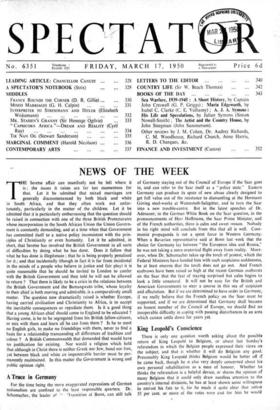A Truce in Germany
For the time being the more exaggerated expressions of German- nationalism are confined to the least responsible quarters. Dr.
Schumacher, the leader of ')position at - Bonn, can still talk
of Germany staying out of the Council of Europe if the Saar goes in, and can refer to the Saar itself as a " police state." Eastern Germany can produce its spate of new abuse clearly designed to get full value out of the resistance to dismantling at the Hermann Goring steel-works at Watenstedt-Salzgitter, and to turn the Saar into a new trouble-centre. But in the latest speeches of Dr. Adenauer, in the German White Book on the Saar question, in the pronouncements of Herr Hoffmann, the Saar Prime Minister, and of the French authorities, there is calm and sweet reason. Nobody in his right mind will conclude from this that all is well. Com- munist propaganda is not a spent force in Western Germany. When a Bavarian representative said at Bonn last week that the choice for Germany lay between " the European idea and Russia," he was not taking a mere oratorical flight away from reality. More- over, when Dr. Schumacher takes up the torch of protest, which the Federal Ministers have handed him with such suspicious suddenness, he at least ensures that the torch does not go out. And French eyebrows have been raised so high at the recent German outbursts on the Saar that the feat of staying surprised but calm begins to look a little unnatural. It will not be easy for the British and American Governments to steer a course in this sea of suspicion and affectation. But if we are determined to have order in Germany, if we really believe that the French policy on the Saar must be supported, and if we are determined that Germany shall become an honest member of the Council of Europe, we should find no insuperable difficulty in coping with passing disturbances in an area which cannot settle down for years yet.


































